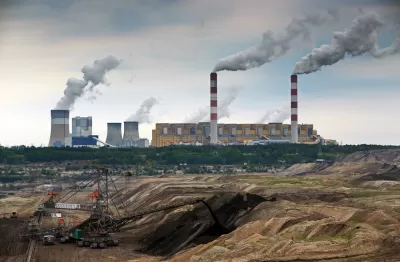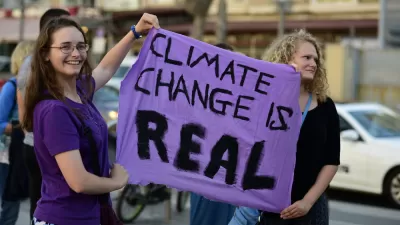The announcement this week that the state of New York's employee pension fund would divest from fossil fuel industries sent shockwaves through the industry and the environmentalism movement this week.

Bill McKibben, founder of the climate advocacy group 350.org, shares news and insights about a historic decision by the state of New York's employee pension fund would divest $12 billion from gas and oil companies, "if they can’t come up with a legitimate business plan within four years that is aligned with the goals of the Paris climate accord."
"The entire portfolio will be decarbonized over the next two decades," according to McKibben. The total value of the employee pension fund for the state of New York totals $226 billion.
Here's how McKibben summarizes the significance of the news:
It’s a huge win, obviously, for the activists who have fought for eight years to get Albany to divest from fossil fuel companies and for the global divestment campaign. Endowments and portfolios worth more than than $14 trillion have joined the fight. This new move is the largest by a pension fund in the United States, edging the New York City pension funds under Comptroller Scott Stringer, who announced in 2018 that the fund would seek to divest $5 billion in fossil fuel investments from its nearly $200 billion pension fund over five years.
The news also suggests to McKibben that the "once-dominant fossil fuel industry has reached a low in financial and political power." To make the case, McKibben lists a series of capitulations that show the waning influence of the fossil fuel industry, and gives credit to New York State Comptroller Thomas DiNapoli, who announced the divestment this week, for standing up to the industry.
FULL STORY: New York State Sends a Blunt Message to Big Oil

Study: Maui’s Plan to Convert Vacation Rentals to Long-Term Housing Could Cause Nearly $1 Billion Economic Loss
The plan would reduce visitor accommodation by 25% resulting in 1,900 jobs lost.

Alabama: Trump Terminates Settlements for Black Communities Harmed By Raw Sewage
Trump deemed the landmark civil rights agreement “illegal DEI and environmental justice policy.”

Why Should We Subsidize Public Transportation?
Many public transit agencies face financial stress due to rising costs, declining fare revenue, and declining subsidies. Transit advocates must provide a strong business case for increasing public transit funding.

Paris Bike Boom Leads to Steep Drop in Air Pollution
The French city’s air quality has improved dramatically in the past 20 years, coinciding with a growth in cycling.

Why Housing Costs More to Build in California Than in Texas
Hard costs like labor and materials combined with ‘soft’ costs such as permitting make building in the San Francisco Bay Area almost three times as costly as in Texas cities.

San Diego County Sees a Rise in Urban Coyotes
San Diego County experiences a rise in urban coyotes, as sightings become prevalent throughout its urban neighbourhoods and surrounding areas.
Urban Design for Planners 1: Software Tools
This six-course series explores essential urban design concepts using open source software and equips planners with the tools they need to participate fully in the urban design process.
Planning for Universal Design
Learn the tools for implementing Universal Design in planning regulations.
Smith Gee Studio
Alamo Area Metropolitan Planning Organization
City of Santa Clarita
Institute for Housing and Urban Development Studies (IHS)
City of Grandview
Harvard GSD Executive Education
Toledo-Lucas County Plan Commissions
Salt Lake City
NYU Wagner Graduate School of Public Service





























